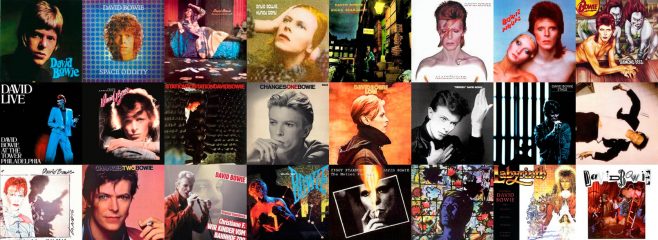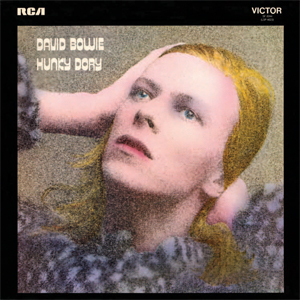
“Hunky Dory” is David Bowie’s 4th studio album, originally released on 17 December 1971.
In 1971, David Bowie was still a relative unknown, who had that weird one-off hit a couple of years previously about a doomed astronaut called Major Tom. His previous three albums had all been commercial disappointments that had failed to chart. All that was soon to change with some key personnel entering the picture, although sadly not initially with this remarkable album.
The most significant new figure to enter the Bowie universe was Tony Defries, a solicitor who would help Bowie get out of his management contract with Ken Pitt and who would in turn become Bowie’s new manager. Defries provided Bowie with the aggressive management push his career needed, help with some shrewd commercial contracts and ultimately steer Bowie towards superstardom. That Defries would in the process line his own pockets with Bowie’s success via his new MainMan empire and leave Bowie resentful and almost broke was a consequence that wouldn’t become clear for a number of years to come. But Bowie was desperate for success and basically dived in somewhat naively with Defries to make it happen for him.
Defries signed Bowie to a then excellent publishing contract with GEM but more importantly signed him to a new record label in RCA who were desperate for a new “Elvis” to be added to their recording lineup. Defries saw lots of raw potential in his new prodigy and realised that ultimate success only really comes by cracking into the US market. RCA were willing to push Bowie in the US as much as in the UK and so were the perfect recording label. The future was finally looking bright at long long last.
Bowie went into Trident Studios, London in June 1971 to begin work on his first album with RCA.
Tony Visconti had enough of working with Bowie after the troublesome “The Man Who Sold The World” recording sessions and decided to concentrate his efforts with Marc Bolan’s blooming T. Rex. He was replaced by Ken Scott in the co-producer’s chair who would go on to help produce Bowie’s upcoming monster glam albums.
Visconti was replaced on bass guitar duties by the excellent Trevor Bolder, who had worked previously with both guitarist Mick Ronson and drummer Mick “Woody” Woodmansey in their native Hull in the group The Rats. The future legendary “The Spiders From Mars” were now in place…
However, the musician I think most contributes to the overall vibe on “Hunky Dory” was the legendary Rick Wakeman on piano. Bowie had began writing much of his new material on the piano, but didn’t feel confident enough to play some of the expansive chords sequences he was conjuring together. Wakeman had worked with Bowie previously on “David Bowie” (aka Space Oddity) but his work here on tracks such as “Oh! You Pretty Things” and “Life On Mars?” are truly inspired. Bowie offered Wakeman a permanent gig as one one the “The Spiders From Mars” but the temptation of joining supergroup Yes finally won out.
Mick Ronson is also worth a very special mention for his contributions, not just with his admirable guitar work both also for his gorgeous arrangements, which help so many of the tracks here to soar.
The resultant sessions produced one of the truly great albums of all time. However, it still seems remarkable to me that this glorious masterpiece was a complete flop upon its initial release.
The album kicks off with Bowie’s second great iconic track “Changes” (behind Bowie’s first classic 1969’s “Space Oddity“). In so many ways, this song previews Bowie’s career to come, both in terms of the many changes and musical manifestations that would mark Bowie’s catalogue but also in the lyrical content in which he refers to the current youth as a new future race. The song starts with a little piano flourish before Wakeman’s distinctive piano riff kicks in that dominates throughout as Bowie sings “Still don’t know what I was waiting for, And my time was running wild, a million dead-end streets” which rather nicely encapsulates Bowie’s faltering career thus far. The second verse contains the key lines “So I turned myself to face me, But I’ve never caught a glimpse, Of how the others must see the faker, I’m much too fast to take that test” in which he refers to himself in both the first and third person, a technique he used on the previous “The Man Who Sold The World” and would reuse with his many future characters. The band then kick in during the catchy chorus as Bowie takes a big slice out of The Who, a band he’s admired for many years as his multi-track vocals spits out “Ch-ch-ch-ch-changes” in the same stuttering style used by The Who on their classic “My Generation”. Bowie pleads for us to “Turn and face the strange” on each chorus coupled with a different bitter proclamation to the current generation such as “Don’t tell them to grow up and out of it” and “Where’s your shame, you’ve left us up to our necks in it“. The track ends beautifully with a final, sombre like sax solo by Bowie himself. Bowie’s clearly “English” vocal expressions, Wakeman’s wonderful piano prowess, Ronson’s sublime arrangements and lyrics referencing a future race are all key components that feature throughout much of the album.
“Changes” was released as the lead-off (and for a long time, only) single, which at the time failed to chart. This would be the last single of Bowie’s to flop in the UK for a long long time, although it did manage to reach No. 66 in the US billboard charts, his first single to make the list. Interestingly, the single finally made the UK charts in January 2016, where the picture disc release made No 49 following Bowie’s death.
The track is very often listed as one of Bowie’s very best, being for example one of four Bowie songs to be inducted into the “The Rock and Roll Hall of Fame’s 500 Songs that Shaped Rock and Roll”.
It would also be a track that Bowie would often play live throughout his career and was in fact performed on 9 November 2006 at the Black Ball fundraiser in New York, his last ever live performance (unless you include his performance of “Chubby Little Loser” when he introduced Ricky Gervais at Madison Square Garden in 2007.
There was no official video made at the time, although his performance at his “retirement” concert on 3 July 1973 is often used, Watch it here.
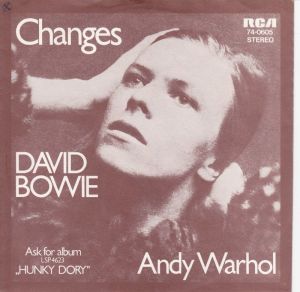
Up next comes the truly fabulous “Oh! You Pretty Things“. Again featuring mainly Wakeman’s wonderful piano part, with the rest of the band only kicking in during the upbeat refrain/chorus, it’s light and catchy musical tones somewhat belies the dark, mystic lyrics. Describing a future when the youth in combination with arriving aliens take over and inherit the earth, it touches on many of the occult themes from his previous “The Man Who Sold The World” album, although here in a far more jolly musical setting. Describing a typical morning, things suddenly change forever “Look out my window, what do I see, A crack in the sky and a hand reaching down to me, All the nightmares came today, And it looks as though they’re here to stay“. Again, it’s a future in which only the youth survive “They’re the start of the coming race, The earth is a bitch, We’ve finished our news, Homo Sapiens have outgrown their use“. It’s classic Bowie a few years before the rest of the world would realise it.
The track gained some prominence when it was released earlier in the year as a tame single by Peter Noone of Herman’s Hermits fame, who made it a No. 12 success in the UK charts. Trust me, Bowie’s version is infinitely (homo) superior…
This track would feature in one of Ziggy Stardust’s earliest TV appearances when Bowie performed it on the “The Old Grey Whistle Test” on 8 February 1972 (which also featured “Queen Bitch”). Sadly, the song wasn’t actually broadcast until many years later. Watch it here.
“Eight Line Poem” is a curious piece, literally a beautiful little eight line poem sung to a lovely Ronson electric guitar part and Wakeman’s backing piano. At one level, it comes across as simple and off-handed, but it really is all rather gorgeous, with Bowie’s wonderful vocals constantly changing on each obscure line as Bowie describes a lazy day as he stares outside his window. I’ve always loved the closing lines “But the key to the city, Is in the sun that pins, The branches to the sky“. As far as I’m aware, this has only ever been played live once on a BBC broadcast as featured on the excellent “Bowie At The Beeb” album.
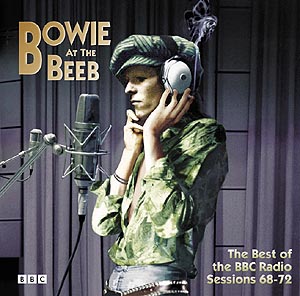
“Life on Mars?” is without doubt, THE highlight. One of the questions I get asked a lot is what is my favourite Bowie song. And although it’s not an easy question to answer, I do feel the answer is this amazing track. I can still remember the first time I discovered this song when I first played the K-Tel “Best of Bowie” album. And it still sends a shiver down my spine with each hearing.
Starting slowly with Wakeman’s wonderful piano part, it describes the sad tale of a lonely girl who goes to the cinema to escape her life for a while, only to see it being played out in all its horror up on the silver screen. Bowie’s vocals are at their very best here as he sets the scene “It’s a God-awful small affair, To the girl with the mousy hair, But her mummy is yelling no, And her daddy has told her to go“. Things pick up pace musically as we enter the stupendous chorus section, where at first we hear the start of Ronson’s truly amazing string arrangement as the girl enters the cinema “But the film is a saddening bore, For she’s lived it ten times or more“, before the band kicks in with the full orchestra in the chorus section as she details the boring movie show on display “Sailors fighting in the dance hall, Oh man, look at those cavemen go, It’s the freakiest show, Take a look at the lawman, Beating up the wrong guy“. It finally reaches its musical climax as Bowie’s vocals so beautifully explodes as he cries out the key question “Is there life on Mars?“. The second verse has a delightful wood-pipe accompaniment throughout as the girl’s imagination starts to take off “See the mice in their million hordes, From Ibiza to the Norfolk Broads, Rule Britannia is out of bounds, To my mother, my dog, and clowns” before we repeat the refrain and chorus but this time with the girl in control “But the film is a saddening bore, ‘Cause I wrote it ten times or more, It’s about to be writ again, As I ask you to focus on“. Ronson’s beautifully sedate solo and his string arrangements have a final burst, before it slowly trails off with booming drums. Then just as you think’s it’s over, the piano tinkers back into action before a phone goes off in the background (a studio mishap that drove Ronson crazy with frustration at the time and so was included as an in-joke, a number of such studio playfulness included in the mix).
Seriously, WOW, what an amazing song !!
On the album back cover, Bowie notes he was “Inspired by Frankie“, a nod towards the fact the track has a similar structure to “My Way”, a song for which Bowie had a set of lyrics rejected (his version was called “Even A Fool Learns To Love”). This is the best way possible to get revenge…
Although both album and song could have been criminally ignored by history had Bowie been hit by a bus in late 1971, Bowie’s success on his next album gave the song a rebirth when it was released as a single on 22 June 1973 during the height of the Ziggy Stardust period. The song fitted Bowie’s new interstellar image perfectly and in combination with a fabulous video by Mick Rock, helped the song reached No 3 in the UK charts. Watch Ziggy Stardust perform in the video here.
Bowie would play “Life On Mars?” on and off throughout his career, all the way until 2005 when he performed a beautiful version at his last “public” appearance at the “Fashion Rocks” show at Radio City Music Hall, NY. You can watch this final, emotional performance here. Sigh.
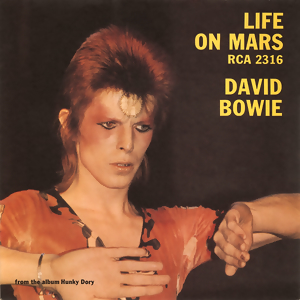
The album is a wonderful combination of light and dark with regard its themes. “Kooks” is lovely little ditty Bowie wrote for his son Zowie Bowie a few days after he was born on 30 May 1971. With a catchy, almost nursery rhyme arrangement and playful blasts of trumpet courtesy of Trevor Bolder, it’s a song that’s impossible to dislike. Bowie vocals are uniquely tender and loving and with lyrics such as “Don’t pick fights with the bullies or the cads, ‘Cause I’m not much cop at punching other people’s dads, And if the homework brings you down, Then we’ll throw it on the fire and take the car downtown“, there’s a humour and playfulness that’s infectious here. It’s a track that Bowie rarely performed live, the most notable performance soon after it was written when he appeared on the John Peel radio show.
If “Kooks” was light, then “Quicksand” is definitely a return to the dark themes. A mainly acoustic arrangement, this is one of Bowie’s most heavy lyrics, touching again upon themes of the occult and Nietzsche’s writings of the coming Superman. With references to the “Golden Dawn“, the secretive occultist, magical order society and its controversial member Aleister Crowley (“I’m closer to the Golden Dawn, Immersed in Crowley’s uniform”), the evilness of Heinrich Himmler and with digs at Garbo and Churchill (“I’m the twisted name on Garbo’s eyes, Living proof of Churchill’s lies, I’m destiny“), Bowie takes us on a dark journey where the “death of Man” is its final destination. During the lovely chorus sequence, Bowie warns us to not “Don’t believe in yourself, don’t deceive with belief, Knowledge comes with death’s release“. However, Bowie also warns us that he might not be the saviour, “I’m not a prophet or a stone-age man, Just a mortal with the potential of a superman” and that “I’m sinking in the quicksand of my thought, And I ain’t got the power anymore“.
It’s powerful stuff that is somewhat undermined by the gentle guitar arrangements. It’s a song that would get very little live airplay until the mid-90’s when Bowie rediscovered the track and performed it frequently from then on in.
Side Two is basically devoted to a number of tribute pieces, the first to Biff Rose and Paul Williams as Bowie playfully covers their song “Fill Your Heart“. Almost the exact opposite vibe to the previous “Quicksand”, its lightheartedness, joyful arrangement and hilarious vocal delivery, especially when Bowie sings the final “Love will clean your mind and makes you freeeeeeeeeeeeeee“, it can’t but put a smile on your face. It was a last minute replacement for “Bombers” (discussed later) and the album overall is better for it. It’s a track that Bowie played live a few times at around this period, most noticeably at Aylesbury, but was doomed to disappear forever from the live set once Ziggy Stardust arrived.
“Andy Warhol” is an affectionate dig at the famous artist and all-round multi-media odd ball, who Bowie admired for quite some time, especially with his ties to “The Velvet Underground“. Starting with some studio chat where the pronunciation of Bowie’s idol is under some humorous debate, it’s a great track featuring some wonderful acoustic guitar work by Ronson. You can see why Bowie was so enamoured with the whole Warhol scene with killer lines such as “Dress my friends up just for show, See them as they really are, Put a peephole in my brain, Two new Pence to have a go“, which predicts somewhat Bowie’s upcoming years. There’s a lot of humour here, with “He’ll think about paint and he’ll think about glue, What a jolly boring thing to do” as funny a line as Bowie has ever penned. (Warhol was slightly less impressed when Bowie played the song to him later in the year, although Warhol was taken by the shoes Bowie was wearing). The track ends with Ronson’s catchy multi-track flamenco style guitar and a round of studio applause. It really is one of the many treasures found within.
The track was originally written for Bowie’s friend Diana Gillespie and featured on her album “Weren’t Born A Man” and is well worth checking out as it also features Ronson on guitar. Bowie would perform the song live during this period and during an acoustic set within the early Ziggy Stardust shows, as featured on the excellent “Santa Monica ’72” live album. Bowie would resurrect the song again during the “Outside” tour in 1995.
“Song for Bob Dylan” is another tribute song for which the man of honour was reported less than thrilled about. Incorporating an intro and style similar to Dylan’s own “Song To Woody” (“Oh, hear this Robert Zimmerman, I wrote a song for you“), the song is actually less a true tribute but more a plea from Bowie for the great Robert Zimmerman to get back to roots and start fighting for social issues again. “Tell him we’ve lost his poems, So we’re writing on the walls, Give us back our unity, Give us back our family” sums up Bowie’s frustrations. Bowie also nails down Dylan perfectly “With a voice like sand and glue” and cleverly “glues” together both Warhol and Dylan. Musically, the track has a Dylan-like vibe, with Ronson’s sublime electric guitar and Wakeman’s piano working perfectly together, although if I had to pick the weakest track on the album, this would get my vote. Bowie would perform this live a few times during this period before dropping it for good.
“Queen Bitch” is yet another masterpiece contained within. The inspiration here and nod of affection is for Lou Reed and The Velvet Underground, with their wonderful hard edgy soundscapes and sordid tales of New York. The original back sleeve notes refers to the track as “some vu, white light returned with thanks“. Bowie mimics them here perfectly, with a hard rock sound and sexually explicit lyrics that more than any other track encompasses and foreshadows the Ziggy Stardust scene to come. The future Spiders From Mars break free and simply shine as they rock things out. Bowie’s positively annoyed and distraught as his male sexual partner succumbs to the allure of that Queen Bitch “He’s down on the street and he’s trying hard to pull sister Flo, Oh, my heart’s in the basement, my weekend’s at an all-time low“. But her allure is too strong “She’s so swishy in her satin and tat, In her frock coat and bipperty-bopperty hat, Oh God, I could do better than that” and Bowie is resigned to a lonely night in his hotel room “Yeah, I lay down a while and I look at my hotel wall, And he’s down on the street, so I throw both his bags down the hall“. It’s nothing short of an early Bowie classic.
“Queen Bitch” was performed during the early Ziggy Stardust tours and on several subsequent tours, but it’s appearance on the Old Grey Whistle Test in one of Ziggy’s first ever TV appearances that is the most iconic. Watch it here.
The album ends with the legendary epic that is “The Bewlay Brothers“. It carries on the tribute theme of side 2, this one a more obscure and sinister tribute to Bowie’s half-brother Terry that rounds off the album perfectly. Starting with a gentle basic acoustic guitar arrangement (played by Bowie) coupled with Ronson’s subdued electric guitar, Bowie’s lyrics here are beautifully and masterfully cryptic, eerie, serene, dreamy, imaginative and dense, all in a manner that has intrigued and fascinated Bowie fans for decades. Broken up into three verse/refrain sequences, it begins “And so the story goes they wore the clothes, They said the things to make it seem improbable, Whale of a lie like they hope it was“. The references to Terry are many, such as “I was stone and he was wax so he could scream and still relax, Unbelievable, And we frightened the small children away” and “And my brother lays upon the rocks, He could be dead, he could be not, he could be you, He’s chameleon, comedian, Corinthian and caricatur” but there’s a lot more going on here than Bowie sadly reminiscing about a mentally ill brother he would soon basically abandon. The music expands out beautifully during the refrains where Bowie’s vocals become less dead-pan and become full of anguish and pain, especially in the last section “Oh, and we were gone, Kings of Oblivion, We were so turned on, In the night walk pavilion“. The piece completes with a chilling sequence of schizophrenia induced demonic voices as if a possessed laughing gnome has had enough of this world, where Bowie intones “Lay me place and bake me pie I’m starving for me gravy, Leave my shoes, and door unlocked I might just slip away” as the weird voices slowly fade while pleading “Just for the day, ay
Please come away, ay“… The song really is a Bowie tour de force and one of his finest recorded moments.
Although Bowie wouldn’t perform the song live until almost the end of his live career when he debuted it in 2002, it obliviously meant a lot to Bowie as he used the title Bewlay Bros. Music for his music publishing company.
I really do find it remarkable that such an incredible musical experience could have been lost to history if Bowie had been run over by a bus in 1971. The album upon it’s initial release was yet another commercial disappointment and failed to chart, due in some large part to poor marketing and by Bowie himself who quickly lost interest in it and barely promoted it or performed it live at the time.
Thankfully, Bowie managed to dodge said London buses and would go on to make the big time with his next album. Hunky Dory then started to finally get the attention it so very much deserved and entered the UK charts in September 1972 where it peaked at No 3.
History has been very kind to the album and is widely regarded as one of Bowie’s finest achievements. It has reached many a top album ranking, including those of Rolling Stone, Q Magazine, Pitchfork and NME who ranked it the 3rd best album of all time in 2003. Hey, it’s even reached No 2 in Richard Foote’s Bowie list !!
As with most of Bowie’s back catalogue, the album has been re-released a number of times over the years. Most notiably, it was first released on CD by RCA back in 1981 and then again on CD in 1990 as part of the excellent Ryko/EMI series, which included a number of bonus tracks including:
“Bombers” was going to be on the album, until it was (thankfully) replaced by “Fill Your Heart” at the last moment. Available for years on bootleg albums, it’s a pretty weak effort that belongs more in the era of Bowie’s first “David Bowie” album than here. Telling the tale of a poor old man who gets blown to bits by unscrupulous military types for daring to live on a wasteland where they want to conduct a (nuclear) bombing exercise, the mainly piano musical arrangement is all just a little ploddy and unimaginative. Bowie’s high pitched vocals never quite sound right either and it was all a good idea to drop the thing entirely from the album.
Hunky Dory also featured in the excellent “Five Years (1969-1973)” box set released in 2015.
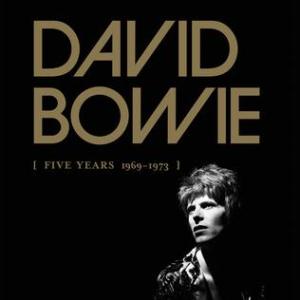
Finally as part of Record Store Day in 2017, the rather nice David Bowie Bowpromo RSD vinyl LP set was released, which featured a nice reproduction of the original (and highly sort after) promotional 1971 LP that had seven differently mixed tracks from Hunky Dory on one side and tracks from Dana Gillespie on the other (missing sadly here).
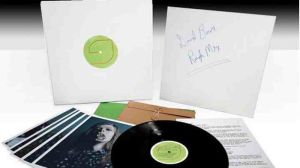
Hopefully next year, there might be a special 50th Anniversary Edition of the album. Fingers crossed.
I simply LOVE this album and can remember when I first bought and listened to it all those many years ago on a cold afternoon in Manchester.
Soon after the release of the album, Bowie had quickly lost interest in the project and was looking forward already to recording a new album. He didn’t think Ken Scott would approve as it was going to be much harder and rocker than this album and was going to be about a weird alien rockstar who was going to take over the world. The hair scissors were already on hand as was the orange hair dye. Bowie was absolutely convinced he had finally found the musical formula (and image and stage persona) that would at long long last bring him the success he had craved but evaded him for so long.
And of course, Bowie was absolutely correct. With Bowie’s next album, he was going to hit the big time and true superstardom. But that’s a story for another day…
Best Tracks: “Life On Mars?”, “Oh! You Pretty Things”, “Queen Bitch”, “The Bewlay Brothers”
